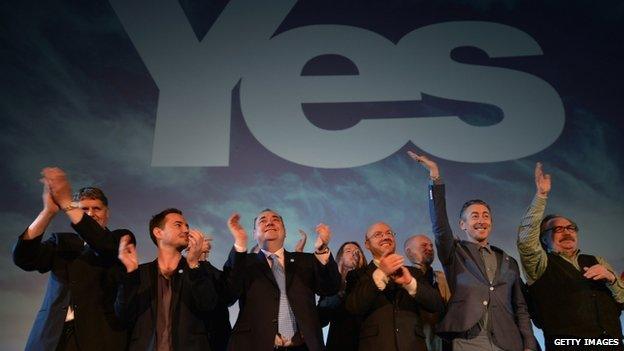Fact check: the Declaration of Independence
- Published

As a cultural event, it may have had a sprinkling of Hollywood and Holyrood A-listers, but the reviews for the launch of Yes Scotland in an Edinburgh cinema on Friday fell some way short of critical acclaim.
I wasn't there, and can't judge the quality of the performance or entertainment. But what about the numbers and the claims being made at and around the launch? Perhaps it's time for a fact check.
Two elements of the Fountainbridge Declaration of Independence are worth a look, starting with the central claim that "it is fundamentally better for us all, if decisions about Scotland's future are taken by the people who care most about Scotland, that is, by the people of Scotland".
Straightforward enough. But the logic behind that is that Scotland would be better out of the European Union as well as the British one.

Actor Alan Cumming brought a touch of Hollywood to the campaign launch
Replace the word 'Britain' for 'Scotland' in that statement, and you have the position of the UK Independence Party.
As it happens, the Greens, Scottish Socialists and others such as Margo MacDonald MSP are much more suspicious of the European Union than the Scottish National Party has been for the past 24 years.
You could, of course, counter that independence would at least give Scots the choice of being in or out of Europe, and numerous other alliances to which this fundamental claim is compromised.
Green fair ways
The declaration goes on to state: "We can build a greener, fairer and more prosperous society". Indeed, we can. But it might help to remember the tensions between those three goals, which were also evident in the loose alliance of pro-independence signatories on Friday.
Maximising growth can come at the expense of fairness, particularly if it is through the forces of globalisation. It's not just evident in the free market, deregulated economies of the US and UK, but it can be seen in India and China as they grow too.
And given the importance of oil and gas revenues to achieving this greater prosperity in Scotland, how does that square with making the country greener - particularly when claims are repeatedly made that a country that produces as much oil as Scotland shouldn't be paying such high fuel tax?
Evidence shredded
On the numbers, Alex Salmond said he wanted a million signatories to the declaration. Ambitious goal-setting is an important part of leadership, and it helps to be realistic too.
The round number of a million brought to mind a speech in October 2006, months before becoming first minister, when Mr Salmond envisioned a million small wind turbines powering Scottish homes, on house roofs and in its gardens.
That meant roughly two turbines for every five homes, including all those who live in flats. Achieving that by 2016 was a tall order then. It looks taller now. I reckon the million signatures looks a safer bet.
Also on the numbers, there was a claim made by Nicola Sturgeon in a radio interview on Friday morning: that there is "not a shred of evidence" that an independent Scotland using sterling would have a different borrowing rate from that of the UK.
In a way, the SNP's deputy leader is right, because no-one's yet tried an independent Scotland in the modern monetary era. But let's look at other countries in the eurozone currency alliance, who might give some pointers. Is there a shred of evidence that they have a different borrowing rate? Yes, a lot of it.

Scottish Green Patrick Harvie joined Alex Salmond at the signing
Until the start of the downturn, it was assumed that the interest rate on governments' borrowing across the eurozone hardly needed to vary.
From Germany to Greece, they were locked together with the implicit assumption the governments collectively, or the European Central Bank, would stand behind each government's debts.
That's precisely the issue at the heart of the eurozone crisis for the past two-plus years, because that implicit assumption turned out to be wrong. It's now clear that they're not backing each others' debts, at least so long as Germany withstands the pressure to issue common European bonds.
So the yields on 10-year government bonds - that's the rate the market sets for benchmark government borrowing - vary widely. Last week, as money poured into safer havens, some yields hit record lows; Germany below 1.5%, while the UK and the USA went below 1.8%. France and Austria were between 2.4% and 2.7%. But elsewhere in the eurozone, Italy was above 5% and Spain was heading towards the danger zone of unaffordability, above 6%.
Portugal has already been bailed out, so it doesn't have to borrow on markets which price its risk with yields above 12%, and Greece likewise needn't bother asking private lenders to buy new bonds, with the yield nearing 30%.
There are a number of reasons for that difference. One of them is a difference in perceived risk that governments won't be able to pay for their borrowings.
Another, which helps explain the UK rate, is that mobile capital heads for perceived safety in troubled times.
As it happens, the cost of insuring UK bonds against non-payment has risen steeply recently, but money still floods into London for safety, and demand for bonds pushes prices up, meaning yields automatically fall.
It's not clear why money would flood into the market to buy Scottish government bonds as a safe haven, least of all when they start, inevitably, with no track record. Bond traders will make a judgement on the credit rating of a newly-independent Scotland.
Why would it start with Britain's triple-A rating, when it has no credit history? Because it's got oil revenues? Perhaps, but that's also a source of volatility that other European nations don't face in their budgeting, and volatile prices equate to risk.
If a currency union is agreed with Westminster for the Bank of England to be lender of last resort for an independent Scotland, that would clearly reduce the market's perception of a risk of default.
But it's not clear if that deal would be done, and if so, what conditions would apply. That's where the case for independence runs into the compromise of fiscal constraints, where a formal currency alliance would surely mean limits to borrowing for partners in both Westminster and Holyrood.
Balanced budgets
Asked if Scotland could be seen as a reliable currency partner, Ms Sturgeon told the Today programme on BBC Radio 4's that Holyrood has shown its sound financial management by balancing its budget every year since MSPs were first sworn in 13 years ago.
This isn't quite as impressive a feat as it might have sounded. Nor was it the generous praise to her Labour/LibDem predecessors that some might have thought. Until now, Holyrood's revenue has had very little flexibility, and as it's lacked any borrowing powers, the Scottish government simply has to balance its books.
So it's not an achievement so much as a requirement. And it's been accompanied by many calls from Scottish ministers that they would like very much to borrow more to stimulate more growth into the economy.
Whether or not they're right to call for that, it would mean unbalanced budgets and, at least initially, bigger deficits.
Any bond trader wanting to price risk on Scottish debt might listen with interest to the rhetoric from the Fountainbridge cinema on Friday, as several prominent voices pointed to a radical repudiation of market orthodoxy.
Of course, comparisons with the eurozone are not being welcomed by supporters of independence. It's pointed out - quite rightly - that the gulf in competitiveness between Germany and Greece is a cause of the divergence of their economies, and it's not parallelled within the UK. The Scottish and English economies are much more similar.
Indeed, they are heavily integrated economies, and have probably never been so similar. Scotland's economic performance is closer to the UK average position than almost any other nation or region, and that includes London.
But of course, there's another constraint there. If that similar competitiveness profile is important to co-ordinating currency and monetary union, then it's another parallel track that would have to be retained after independence.
'Yes' is just the start
Perhaps the most significant lesson from the varied supporters of independence at Friday's Fountainbridge declaration is that a 'yes' vote is not for a pre-agreed set of policies, but for the start of a process of making a lot more choices. And as with the tensions and trade-offs between growth, fairness and environmental sustainability, they are far from easy options.
The SNP plans to publish a blueprint for independent government ahead of the referendum. It has to, as it's already facing many questions on the details of its vision.
But it may not be the one that matters. The Scottish National Party will be only one of the offerings that would face the electorate at subsequent elections. And if Scotland is independent at those ballots, variations on the current Unionist parties would also have their prospectuses.
Voters' judgement on 'yes' or 'no' will therefore have to be a reckoning not on the credibility or appeal of the SNP's policies, or its record in government, but on the outcome of future elections, which may or may not be won by the Scottish National Party.
Would MSPs in 2016 and 2020, and then from 2024, want to lower or raise tax? And for whom? Free public services, or rationing of scarce resources? Flexible for business, or directing it towards social goals? What about the scale and responsibilities of the state? The flexibility of the labour market?
A 'yes' to independence opens the door to a lot of other questions about the kind of country Scots want to shape.
Mind you, a 'no' to independence raises quite a few of those questions too.